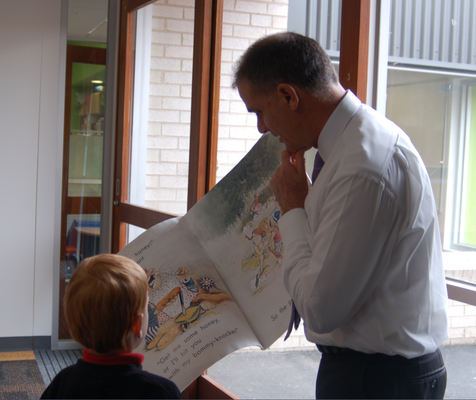
By GEORGIA WESTGARTH
LITERACY and numeracy skills among Australian children have largely slipped in writing tasks.
But Doveton College principal Greg McMahon says he sees the stats as an opportunity, not a crisis.
“We’re seeing the advantage that early learning is having on the children coming through and we know that the model works – we just have to keep building on it,” he said.
Doveton is one of the seven most disadvantaged suburbs in the state and Doveton College’s National Assessment Program Literacy and Numeracy (NAPLAN) results have mirrored those figures.
Some 40 per cent of Doveton College students come from refugee backgrounds and Mr McMahon said
Prep students’ skills at the college were well below those of Prep students in middle class suburbs.
“We start a long way behind other schools because English is a second language for many of our students which means their parents often can’t speak English and those children are missing out on a lot of learning at home,” he said.
Recent NAPLAN results found Doveton College students were significantly behind the state average for reading.
The study showed 58 per cent of Year 3 and 70 per cent of Year 5 students at Doveton College were below the expected level in reading – compared to the state average of four per cent in Grade 3 and five per cent in Grade 5.
Mr McMahon acknowledged the college had a long way to go but said they were already seeing improvements through their early learning centre.
“Some students arrive here with no idea of letter recognition, cannot write or recognise their name and through the early learning centre we are seeing children arriving in Prep who can do all those things,” he said.
Focusing on explicit directed teaching from as young as five years old, Mr McMahon said the school was growing students in terms of where they started and finished in a one-year period a lot quicker than many middle-class schools.
“We’re picking up students and moving their abilities from zero to five in a year, whereas other schools may be picking them up at a level three and moving them to five,” he explained.
Australian Curriculum Assessment and Reporting Authority CEO Robert Randall said the 2015 NAPLAN results showed little change in the national student achievement level.
“Improvement in NAPLAN results comes about when student learning improves. Literacy and numeracy are the foundations of learning at and beyond school.
“If student knowledge, skills and understanding are not improving in these areas, it is a cause for reflection,” Mr Randall said.
Mr McMahon is confident that over time the colleges NAPLAN results will slowly improve.
“We are in our fourth year now and we have noticed the advantages of the early learning centre and those advantages are transforming the Prep and Grade 1 groups and we’ll see those outcomes in the NAPLAN results in the next two years,” he said.






